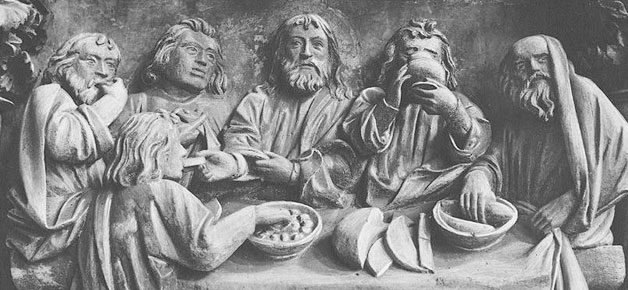
Exodus 12:1-13; 13:1-8 & Luke 22:14-22
This story of the Exodus…continues our reading of the Hebrew Scriptures. It’s not just history, but their-story: the story that creates and identifies Israel. It’s also our story through the teaching of Jesus that we read in Luke 22: a re-interpretation of the Passover to includes the Gentiles and Goyim that we are. How do you hear the institution of the Passover meal? How do you see it reflected, remembered and reinterpreted in our sharing of the communion bread and cup?
The word Passover פֶּסַח [Pesah] in Hebrew, means “to pass over, or through, to guard and/or protect.” The 10th plague is announced, the death and sanctification of the first born among the Empire of Egypt and the Hebrew house of slavery. It’s from the terror of such chaos inducing destruction that the Hebrews are freed from their chains in Egypt. In Hebrew they call the land מִצְרַיִם [Mitzráyim]. The word is rich in meaning, principally representing a place of hardship, distress, oppression, a narrow place. It refers both to the narrow strait of water to be crossed (the Sea of Reeds) and the land of slavery as a place of hardship that squeezes life out of the oppressed. The meal is a celebration in anticipation of freedom from such a narrow place, as well as an active remembering of God’s past faithful intervention.
Jesus takes the religious ritual of Passover in which the Hebrews find their identity and re-interprets and re-orients it with a prophetic gesture. It’s not just the past, but the present and future, not just for Jews, but all who drink of the cup and eat of the bread.
Questions for Examen & Contemplation
- As we see in theses foundational texts both the Passover and Communion are firmly rooted in the notions of deliverance by God’s intervention in history. How have you experienced the mighty hand of God in your life? When? Where? How did you recognize it? (During? After? Now?)
- These identity-giving and life-affirming meals are more than rituals, they are community actions that reorient us from the past toward the future, empower us to reinterpret the present, to remember God’s faithfulness to discern it today. How have you experienced that active and directive discernment in sharing communion?
- How have you, or maybe we, let this meal of deep transformation, radical hope and spiritual discernment become an action that is empty, a gesture that becomes more about us than about what God is doing in the world?